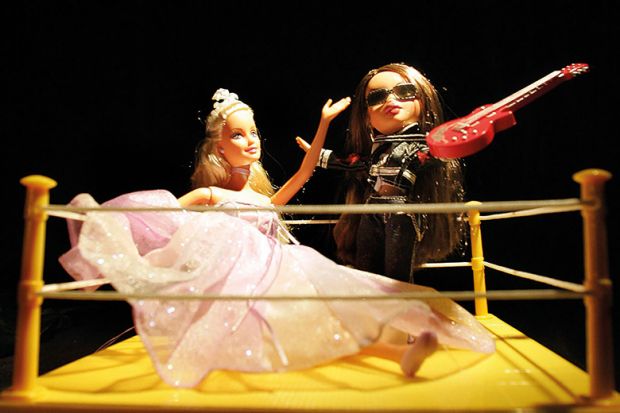Long before Safe and Carol, director Todd Haynes made a 43-minute biopic about the singer Karen Carpenter, who died of anorexia at 32. In Superstar: The Karen Carpenter Story (1988), he recreates her rise to fame and descent into starvation, staging the drama with Barbie dolls. As Carpenter wastes away, her already thin Barbie avatar becomes ever more skeletal. Barbie’s maker, the toy behemoth Mattel, was not happy about Superstar and warned Haynes about copyright infringement, but the matter never escalated because another entity was preparing to take him to court. Haynes hadn’t bothered to get the Carpenter estate’s permission for his soundtrack. Thus, Superstar’s scenes of Barbie – America’s sweetheart – purging and starving never saw commercial release.
Barbie, who debuted in 1959, is one of the most successful doll franchises in history and also one of the most controversial. Whether criticised for her improbably bodacious figure or her vapid white superficiality, Barbie has had more than her share of detractors. Chief Judge Alex Kozinski summed it up when adjudicating Mattel’s 2000 lawsuit against MCA Records over the song Barbie Girl by the Danish-Norwegian band Aqua. Barbie, Kozinski wrote, “has been labeled both the ideal American woman and a bimbo…With Barbie, Mattel created not just a toy but a cultural icon.”
It’s the fight to preserve Barbie’s fame, reputation and profitability that Orly Lobel tracks in her captivating book You Don’t Own Me. A professor of law at the University of San Diego, she meticulously documents “the longest, most heated litigation in the doll-eat-doll toy industry”. MGA’s 2001 launch of a new doll, Bratz, led to a decade of tumultuous litigation, with Mattel complaining of a “rival-led Barbie genocide”.
You Don’t Own Me is an extended case study that’s fascinating and consequential thanks to Lobel’s storytelling skill. Through her descriptions of flamboyant personalities and outrageous corporate scheming, she elevates the story of a protracted legal case into a page-turner that holds up a lipstick-pink mirror to both American consumer culture and corporate misbehaviour.
You Don’t Own Me begins with the birth story of Bratz. In 1998, a Mattel designer named Carter Bryant took a year’s leave of absence. Inspired by the imaginative style of high school students, he sketched a series of feisty, playfully cartoonish, multi-ethnic dolls with oversized heads and feet, huge eyes and bulbous lips. Bratz wore edgy urban clothes, not the stiff ball gowns and matching miniskirt sets that Barbie preferred. Barbie’s vanilla Aryan frigidity was no match for Bryant’s funky “FrankenBratz”.
When Bryant returned to Mattel, he cut a deal with MGA Entertainment to produce Bratz. The timing couldn’t have been better. “A new generation of girls were no longer interested in playing with Barbie,” Lobel writes, and sales were declining. As a result, “Bratz sales grew from 97 million dollars in 2001 to 1 billion dollars by the end of 2003”. The ageing “ice queen”, as Lobel repeatedly refers to Barbie, “was suddenly dethroned by a modern, voluptuous, multiethnic doll”.
Mattel slapped MGA with a $500 million (£368.7 million) lawsuit claiming that Bryant’s labour belonged to Mattel. Like most employees in US corporations, reports Lobel, Bryant was “never paid any royalties for his designs” at Mattel beyond his base salary. She explains that while other countries oblige corporations to give employees a share of the profits their inventions generate, US law is anomalous in requiring “no reward for employee-inventors”.
Here Lobel backtracks to tell Barbie’s own shady history: “Once upon a time, Barbie was a German hooker.” In 1956, Ruth Handler, the wife of a Mattel co-founder, was travelling in Germany and discovered a sexy doll called Bild Lilli, based on a risqué gold-digging cartoon character. Handler smuggled several Bild Lillis back to the US and persuaded Mattel to produce knock-offs. Barbie, claims Lobel, was “the first mass-manufactured adult-looking doll for girls” in the US. Yet the similarities with the German doppelgänger were unmistakable, and “ownership over Barbie was contested from her launch”. Mattel bought off Bild Lilli’s German patent holder, and the rest is history. As Lobel comments, “Just as the most jealous lovers are often the most unfaithful, Mattel’s beginnings are unmistakably tainted by an intellectual property dispute.”
Mattel took pains to present Barbie “as a role model”, having an active life (getting her hair done, making ice cream) and boasting “more than 150 careers on her resume”, including nurse, rock star, cupcake chef, veterinarian, aerobics instructor and police officer, serving as an “agent of change for girls”, according to Mattel’s website. Shedding Bild Lilli’s slutty image, Lobel writes, Barbie “became the icon of the me generation”.
In the course of her book, Lobel schools her readers on the ins and outs of patent law, copyright infringement, fair use and how US courts seek to balance ownership against the First Amendment right to free speech. Legally, she explains, “you can use a copyrighted work without the owner’s permission if the use is for a ‘transformative’ purpose, such as to comment upon, criticize, or parody the work”. More specifically, “the courts have decided that parody is fair use but satire is not”. So Barbie Girl was deemed fair use, as was Star Ballz, a pornographic parody of Star Wars, to the consternation of LucasFilm.
The first federal jury trial of the Barbie versus Bratz saga, in 2008, concluded that Mattel owned Bryant’s labour. Two years later, however, Kozinski, a judge of the Ninth Circuit Court of Appeals, struck down that ruling. Lobel’s account of this part of the case is stellar, with deft explanations of contract and copyright law, as well as a lively sketch of the “colorful” Kozinski, whom she calls “America’s champion of free culture”, with a wicked sense of humour.
Kozinski remanded the case back to the federal district court for a second jury trial. This time things went MGA’s way. Mattel’s bad behaviour, such as bullying its competitors and illegal corporate espionage at toy fairs, came to light. “Barbie does not ‘play nice’ with others (particularly her competitors),” MGA lawyers told the jury.
Finally, MGA prevailed, but the moment was hardly victorious. After 10 vicious and expensive years in court, Lobel concludes, “everyone lost” – especially Carter Bryant, the inventor of Bratz, who recedes further and further from the product for which he was responsible.
Ultimately, You Don’t Own Me is less about Barbie’s cultural significance than the landscape of US free market competition and intellectual property law. In the book’s epilogue, Lobel moves away from toyland: “We, as a society, have a choice. We can choose to promote market dynamism or to permit a market of concentrated power. We can create shared spaces for creativity or allow a handful of companies to hoard cultural imagery.” Lobel points to a few companies that are making innovation more rewarding for employees, but when she asks “Does the current hyper-protection of intellectual property promote more innovation or perversely impede it?” it’s clear that she’s in favour of giving credit where credit is due.
Despite having lost her edge, Barbie still makes the news, as when Mattel last year produced a Barbie based on Muslim Olympic fencer Ibtihaj Muhammad, complete with hijab. And Mattel’s Career of the Year Barbie never fails to get media attention.
Since Lobel’s book has been published, there’s been more news about the players in the drama. Just last month, Kozinski abruptly resigned when at least 15 women accused him of sexual misconduct. Perhaps the Barbie Career of the Year for 2018 should be Discrimination Attorney: “#MeToo Barbie”? It’s time to make Barbie a real role model.
Laura Frost is a writer and cultural critic who was formerly a professor of literature at both Yale University and The New School in New York. She is also the author of The Problem with Pleasure: Modernism and Its Discontents (2015).
You Don’t Own Me: How Mattel v. MGA Entertainment Exposed Barbie’s Dark Side
By Orly Lobel
Norton, 304pp, £20.00
ISBN 9780393254075
Published 2 January 2018

The author
Orly Lobel, professor of law at the University of San Diego, was born in Tel Aviv. She studied law at Tel Aviv University then clerked at the Israeli Supreme Court before going on to doctoral studies at Harvard Law School and a fellowship at Harvard’s Kennedy School of Government. Studying the law in two countries, she believes, “allowed me to be more critical of our legal systems, understanding intuitively that our regulations are neither natural nor apolitical”.
While still young, Lobel recalls, she “inadvertently became a feminist critic of the toy industry…when my mother, who is a renowned psychology professor, filmed me in her research videos playing with stereotypical boy toys (trucks, Lego) and girl toys (Barbie, tiaras) and showed these videos around the world to study gender development”.
In her recent work, Lobel has set out to tell “compelling” stories “that make my research and academic arguments accessible to a broader audience. We are all impacted by the laws of work [and] contracts concerning ownership over ideas, but most of us don’t think about how these affect our lives till things go terribly wrong…The courtroom drama and cinematic quality of [the Bratz intellectual property dispute] made it perfect for the book – it’s an entertaining legal thriller, but also a true story that teaches us about markets, culture and how innovation happens in creative settings.
“Intellectual property was enacted for a purpose,” Lobel continues. “Since the early British laws on patent, copyright, trademark and trade secrets, there was an understanding that the goal was to promote progress in arts and science by granting temporary monopolies over knowledge. But if the goals are subverted by excessive definitions of what ideas can be owned and the law can be used as a sledgehammer against new competition, we need to place limits on these laws.”
Matthew Reisz
POSTSCRIPT:
Print headline: When babes in toyland lawyer up
Register to continue
Why register?
- Registration is free and only takes a moment
- Once registered, you can read 3 articles a month
- Sign up for our newsletter
Subscribe
Or subscribe for unlimited access to:
- Unlimited access to news, views, insights & reviews
- Digital editions
- Digital access to THE’s university and college rankings analysis
Already registered or a current subscriber? Login






